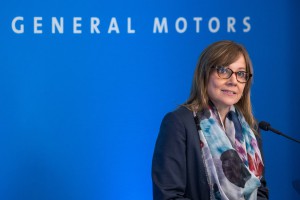
GM's Mary Barra can continue to hold the chairman and CEO jobs at the same time after a proposal to split them failed.
Two shareholder proposals opposed by General Motors top management went down to defeat during the company’s annual shareholders meeting, but not before the two measures gained significant support from shareholders.
The final tally showed that 37% of the shareholders favored a proposal to split the post of chairman and chief executive officer, creating an independent chairman. Mary Barra currently holds both jobs and the proposal to split the jobs has major support from institutional investors, which means it will return for another vote next year and will continue to exert pressure on GM’s board and senior management. The same measure got just 35% of the vote last year.
The second proposal, which received more attention during the meeting, received 29% of the votes from investors calls on GM to disclose its lobbying practices.
The role of the American Automotive Policy Council was a particular target, which represents GM, Ford Motor Co. and Fiat Chrysler Automobiles N.V. in Washington D.C., for its support for weakening clean vehicles standards.
(GM revives Trailblazer for small Korean-built SUV. Click Here for the story.)
The strong vote also shows growing investor concern about misalignment between the company’s policy practices and its publicly professed commitments to climate action, supporters of the proposal said during the meeting.

A proposal to get info about GM's lobby efforts about clean vehicles was voted down at the company's annual meeting.
The proposal was filed by New York City Comptroller Scott Stringer, asked GM to report its lobbying policies and procedures, as well as its spending and its decision-making and oversight of lobbying.
Stringer filed the proposal after a year in which GM lobbied, both individually and through its trade association, to weaken U.S. Corporate Average Fuel Economy (CAFE) and greenhouse gas (GHG) vehicle standards.
The company supported the rollback of the standards despite its publicly stated support for climate action and the transition to a low-carbon economy, a misalignment that many investors say exposes the company and its shareholder to significant risks.
“When a company says one thing in public and advocates for the opposite behind closed doors, as General Motors has done, it puts the company and its owners in harm’s way,” Stringer said. “And when it comes to climate change and emissions standards, it puts our planet and our future on the line.
(Click Here for more about GM, Michelin teaming up to let air out of the tire.)
“Lobbying must be transparent, disclosed annually to shareholders, and consistent with the Paris Agreement. We look forward to working with GM to ensure that’s the case moving forward.”
In the lead-up to General Motors’ meeting, 18 major investors with nearly $2 trillion in collective assets under management expressed concern with GM’s efforts to weaken federal clean vehicle standards in a letter to Barra.
GM’s lobbying efforts have exposed the company and its investors, including diminished global competitiveness, regulatory uncertainty, systemic economic risks from climate change, as well as reputational and legal risks, Stringer said.
“Investors have a vested interest in the long-term success of the U.S. auto industry,” said Jamie Bonham, manager of corporate engagement at NEI Investments. “By lobbying against strong clean vehicle standards, companies like GM make it harder for the industry to remain competitive in a global marketplace that is pivoting toward clean vehicles. This result serves as testament to growing investor support for climate action and their increasing intolerance for any misalignment that put their assets at risk,” Stringer said.
Barra said GM is mindful of the need to mitigate carbon emissions and wants to be part of the solution.
(To see more about GM wanting to be part of the solution for climate change, Click Here.)
In urging a “no,” GM said, “Public policy decisions can significantly affect GM’s strategies, operations, and, ultimately, shareholder value. To protect shareholder value, GM exercises its fundamental right and responsibility to participate in the legislative, regulatory and political processes to ensure decisionmakers are informed by our expertise and insights when considering policies that impact GM.”

GM shareholders snubbed
GM shareholders were snubbed and relegated to sitting in front of a computer screen for the first ever GM computer screen meeting. And if that was not enough – a large percentage of GM shareholders would have needed to turn on their computers before 5:00 am in order to listen to Mary Barra read into a microphone.
This raises the question of whether Mary Barra considers in-person contact with shareholders a nuisance. Meanwhile Ms Barra is on a big campaign walking the GM factories and shaking hands with workers.
An in-person annual meeting is a motivator of good performance by management and directors. Who wants to stand in front of a live audience and explain shrinking sales, epic recalls and loss of market share? It is so much easier to explain it to a microphone.
The following directors deserved an Against vote:
Mary Barra, Chairman and CEO
Theodore Solso, Lead Director
Patricia Russo, who chairs the GM Governance Committee
These directors can be considered the directors most responsible for a computer screen meeting annual meeting. Patricia Russo also chairs an underperforming company, Hewlett Packard Enterprise Company, which was an early supporter of computer screen meetings.
GM would not announce the vote results for these 3 directors.
John Chevedden
Once a company starts a computer screen meeting it can then be a race to the bottom.
For instance Netflix ($150 Billion market capitation) had a computer screen meeting in 2018.
The Netflix part of its 2019 computer screen meeting took 5-minutes.